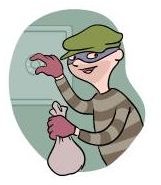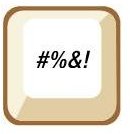How To Avoid Plagiarism: You Will Get Caught if you Plagiarize
A Funny Thing Happened…This Is A True Story
In this article, I am going to tell you how to avoid plagiarism. This story is a large part of the reason why.
I remember taking a class in college about writing grants for non-profits. The professor was kind. She had a quirky sense of humor and loved to help students. Her voice never boomed; when she spoke, you needed to listen.
In every class she would show a power point. I remember one day, half way through the class, much to our surprise, the projector displayed a picture of the flames of hell.
In my head she had horns, was holding an iron pitch fork, and had fire shooting out of her eyes. Amidst the flames in big yellow letters was the word: “Plagiarism.” She glared. We all knew someone in the class had red hands. We wondered who all was on her hit list because of this sin. Soon another slide appeared that read: “Riot Act” and this professor laid down the law on us.
We were all shaking.
Teachers hate plagiarism. In this article I’m going to tell you:
- What plagiarism is.
- How easy plagiarism is to catch (and thus: why it’s stupid to do it.)
- Some common questions and how to avoid plagiarism.
Why is this important for you to know? In my world, everyone is honest, no one ever seeks to get credit for work he or she didn’t do, and everyone owns a puppy.
In reality, lots of people are honest but make mistakes, and sometimes people do (sometimes for understandable, though never justifiable, reasons, like being short on time) try to take the credit for someone else’s work. You can’t be doing that, folks. I’m going to tell you how to avoid plagiarism for your own good. Heed this advice.
What Plagiarism Is:
Plagiarism is theft. Don’t steal.
-End of Article.-
EDIT: Apparently that’s not the end of this article. My editors demand more content. Fine.
Plagiarism is taking another person’s ideas – no matter the format: images, text, sculptures, anything – and then presenting them as your own by refusing to give the original source credit. Let me make this perfectly clear:

Any Source – online or offline
And format – text, images or anything else (Google image search? Totally counts.)
If you didn’t make it, someone else did, and you are obligated to tell the reader who that was. If you present something to your readers without giving credit, the reader assumes you came up with it all on your own. Don’t steal stuff, man!
You are smart enough to create original work, and you should because…
Plagiarism Is Easy To Catch. Plagiarism Is Very Easy To Catch:
If it’s not enough that teachers and professors are well-versed in detecting a voice in writing and knowing if that voice changes, then you need to know that there are many tools available for checking papers and detecting plagiarism.
The program I heard about most was mentioned to me by an English professor and is called Eve 2. In Eve 2, or one of the many

similar programs, the teacher or professor can enter text from an essay and check it against a database.
Look at it this way: With all that is available for catching plagiarism, it’s kind of like playing Russian Roulette, only instead of having one bullet in the cylinder chamber and the rest blank, you have all of the chambers full except for one. Plagiarism is academic death. I kid you not.
If Eve 2 didn’t scare you enough, check out this article addressing plagiarism.
Here Are Three Very Common Questions How To Avoid Plagiarism:
These questions are the most common when people are trying to figure out how to avoid plagiarism.
-
_

What if I come up with an idea that I thought of myself, but it just so happens that someone, somewhere at some point in time came up with the very same idea and I just didn’t know it?_
Answer: It’s a great big world out there. When you are writing a research paper, a part of your job is to have a good handle on the available information, so you can’t mention a big theory and claim it as your own. You’re in trouble either way, either for not thoroughly researching your topic, or for plagiarism.For a response paper, it is not impossible for this to happen, and if you come up with a stunning revelation only to find out that another person has also learned the same and published it prior to your enlightenment, your teacher or professor is likely to point this out to you, but most likely will not punish you for plagiarism.
-
Everything we learn comes from somewhere. Do I need to give credit to Webster for each word I use because I didn’t make the word myself? Where does the madness stop?
Answer: This is perplexing, isn’t it? Here’s the best rule of thumb to keep in mind: If what you’re saying isn’t common knowledge to your audience, and if you didn’t come up with the idea yourself, give credit to the source where you found it.
Also, you want to consider your audience. What would be common to an audience of rocket scientists (their vocabulary and so on) is not common to me. I want to know all about what you’re saying, so let me know where things come from so that I can look into it myself.
-
What if a friend helps me?
Answer: A friend can help you, but a friend can never write words for you (or take a picture for you, or sculpt a sculpture, etc.,). If that happens, you need to make note that you were helped, or you are stealing your friend’s work.
By the way, if does not make it any less criminal (or less academically deadly) if your friend is okay with you stealing his or her work.
A friend can proof-read, and even edit to make sure your voice shines in your work, but a friend can never do your work for you.
Also, you need to know this: Same deal goes for paraphrasing. Cite the source. If it’s not your idea and you don’t give credit to the person who came up with the idea, ’tis theft - and theft isn’t cool. Even if you’re re-working an idea into your own words, you need to tell people where the idea came from. Got it?
There’s more to be gained from this article: What Every Student Should Know About Plagiarism.
When All Else Fails:
If you’re still perplexed about plagiarism and are not sure how to handle a part of your paper, ask your professor or teacher. You are never, ever, hurt by asking how to avoid plagiarism. In high school your teacher is very likely to help you. Also, please know, when it comes to your education, do not settle for short answers if you need to understand better and the topic is vague to you. Ask your teacher for a time you can meet up with him or her to talk a little bit more about it. The odds are highly in your favor that the teacher will make time for you.
In college, the odds are slightly less, they might answer you and then refer you to a book or an editing table – but in college you are all grown up. The professor may just take the time either in person or over e-mail to help you, but if not, make it a quest, a personal goal. This is for your benefit. Make the time for yourself.
All Together Now:
In this article you’ve learned all about what plagiarism is, how easy it is to catch, a few very common questions, and how to avoid plagiarism. In short:

Plagiarism is taking another person’s ideas (in any format) without giving them credit. The key word is ideas, no matter how that idea is presented. Whether you forget quote marks, or fail to give a source when you paraphrase, if the reader is led to think that an idea is yours when it is not, you have effectively stolen the original from its creator.
Teachers and professors hate this because it’s a two-fold crime. First of all, you are taking something that doesn’t belong to you, and that sells the real creator short. However, what perhaps is worst of all is that it makes your academic integrity a lie, and makes your diploma (high school, college or post grad) at the worst a sham, and at the very least, tainted. (And so that Dr. Bob Randolph, the man who wrote something very similar to this in every syllabus he ever had me read, can’t say I plagiarized this: I’m so giving him credit for it right now.)
So please, do not plagiarize; it’s cheap and you’re better than that.
This post is part of the series: Writing A Response Paper: Making All Those Thoughts A Cohesive Whole
This series will take you through the necessary steps to writing a thought-out response paper. You will learn how to turn your outline into a rough draft, how to edit your rough draft (becoming the second draft) and how to polish your second draft. Finally, an article on how to avoid plagiarism.
